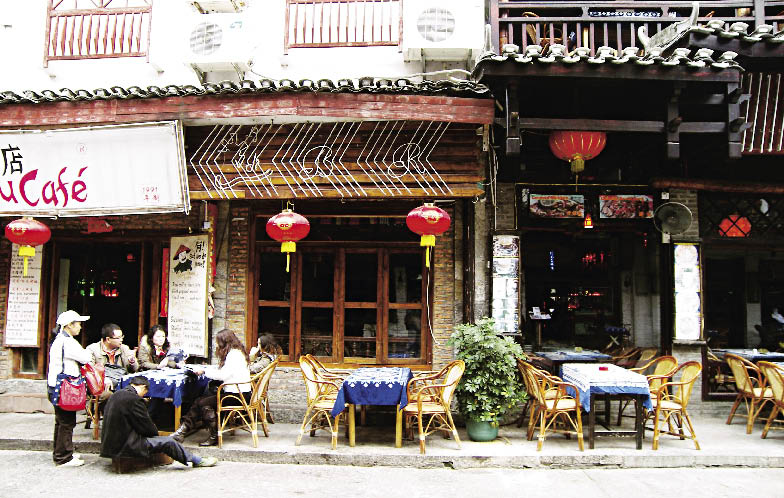| Is Tourism Approaching a Low-price Era?
By staff reporter LIU QIONG
 |
|
The global financial crisis has seen dwindling numbers of overseas visitors to China, evidenced by the empty tables at Western-style establishments on Yangshuo West Street, Guilin. |
Under the influence of the international financial crisis, the price of many hotel rooms, scenic spots, and flights have been sharply reduced in an attempt to stimulate demand. Travel is suddenly costing about half what it did in the past, starting a "low-price era" of tourism.
SINCE Spring Festival, many low-price tours have been listed by Beijing travel agencies, many at half the price advertised before the holiday. These are just a few of the hot deals on offer: "Harbin four-day snow tour with snow sculptures, ice lanterns and Yabuli ski stops, RMB 760 per person; Guilin Yangshuo four-day return flights, RMB 1,690; Jiangxi spring outing six-day package including stops in Lushan Mountain, Jingdezhen and Wuyuan, RMB 1,690."
"We had been to travel agencies many times, but finally gave up due to the unaffordable prices. But during the Spring Festival holiday this year, we finally got the chance to travel, since all our family had time and the price of hotels and scenic spots fell," said Li Yuan, who visited Guilin with her husband and parents. She got the idea of taking a trip after hearing the fuel surcharge on domestic flights would be cut after January 15.
As well as domestic price wars, there is fierce competition in the outbound travel market. The average cost of European trips has always been above RMB 10,000 in recent years. Beijing Caissa International Travel Service, which specializes in European tours, has taken the lead in price reductions, offering a "German eight-day happy tour" for just RMB 7,999.
Huayuan International Travel Co., Ltd. has updated its European tour costs, and now offers a package encompassing eight European cities and a "Free Trip to Paris," costing only RMB 5,799. Packages to London, Rome, Frankfurt, Munich and Athens are all less than RMB 6,500.
"Because of the international financial crisis, many Western currencies have slumped, meaning the exchange rate of the RMB has improved greatly. The fuel surcharge has also dropped, meaning the cost of outbound tours has declined rapidly," explains Wang Yanguang, assistant to the president of the Head Office of the China International Travel Service (CITS). "The current financial storm has made high price routes unpopular, so agents have had to adjust prices to attract tourists. This year will be a low-price year for the tourism industry."
Big Challenges
"We would not lower prices if the financial crisis hadn't happened," says Chen Yating, a staffer at the Ganjiakou branch of the China International Travel Service. According to her, the inbound tour market had its gloomiest year in 2008 since the SARS crisis of 2003. Affected by many aspects, numbers dropped and many tours were cancelled. Furthermore, the 2008 Beijing Olympics pushed up hotel prices and vehicle hire, shrinking the profits of tour-related businesses.
|
